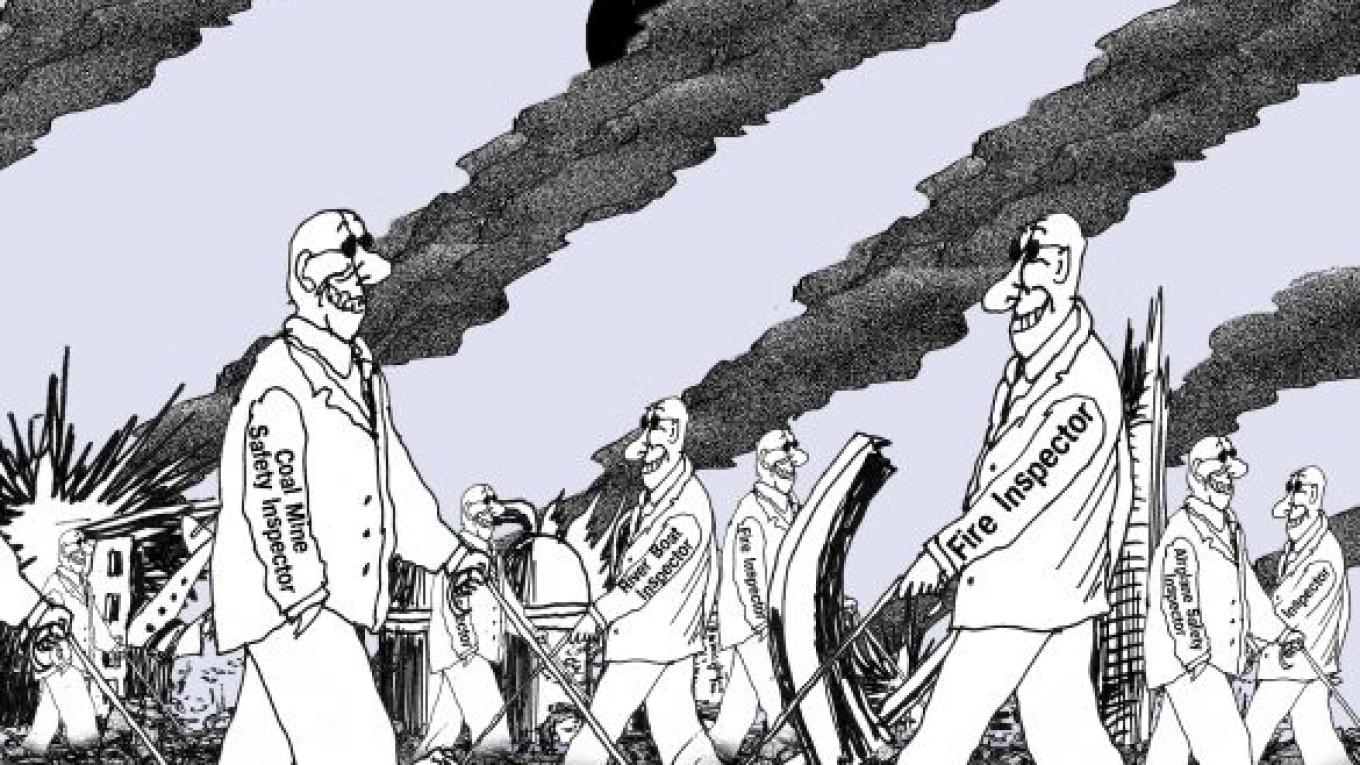Russia has experienced so many tragedies caused by human error in recent years that it deserves an entry in the Guinness Book of Records.
Exactly 20 days before the Bulgaria riverboat sank in the Volga, killing 122 people, a Tu-134 passenger plane crashed near Petrozavodsk, leaving 44 dead. Like the 2010 crash of the Tu-154 near Smolensk, which killed the Polish president and the 95 other members of his delegation, the Petrozavodsk crash was blamed on pilot error. But in both instances, the pilots were attempting to land at poorly equipped airports.
On Aug. 17, 2009, an engine room of the Sayano-Shushenskaya hydroelectric plant in the Khakasia republic flooded, killing 75 workers. The cause: A repaired turbine was off balance from the moment it was reinstalled. The question was not if it would explode but when.
On May 8, 2010, an explosion ripped through the Raspadskaya mine in the Kemerovo region that took the lives of 91 men. The cause: Miners laid a wet cloth over sensors, hampering their ability to monitor the level of explosive methane gas.
On Sept. 14, 2008, a Boeing 737 went down near Perm, claiming 88 lives. The cause: a drunken pilot. A cursing match took place in the cockpit before the crash, with the crew members bantering:
“Where is that damn button?”
“You’re pushing the wrong one, idiot!”
The confused button-pushing continued for some time as the drunk pilots pushed every button they could lay their fingers on. The Boeing could only take so much of this abuse before it went into a tailspin and crashed.
Dec. 5, 2009, in Perm, a pyrotechnics display ignited a fire at the Khromaya Loshad nightclub, killing 160 people. The main cause of the high death toll was the walls and ceiling were covered with highly toxic polystyrene paneling that gave off deadly fumes when it burned. The fumes asphyxiated the people in the club even before the flames touched them.
During Putin’s rule, Russia’s population has decreased by 2.5 percent, while the number of bureaucrats has risen by 42 percent.
Russia has an agency called the Federal Service for Environmental, Technological and Atomic Inspection that is charged with monitoring compliance with technical and safety standards. What did the inspectors do to prevent the Raspadskaya and Sayano-Shushenskaya disasters? How do they monitor these dangerous ticking time bombs across the country? Why do they get away with closing their eyes to blatant safety violations at these facilities? If they aren’t performing their basic safety monitoring functions, shouldn’t they be fired?
Russia employs an army of 80,000 fire inspectors. Are they preventing fires? Clearly no. The number of deaths by fire is 10 times higher in Russia than it is in the United States.
The owner of any river boat can always pay a bribe to renew his operating license rather than make the necessary repairs to avoid capsizing. Paradoxically, doing repairs can actually increase the price of a bribe when the inspector says to the boat owner: “Aha! Since you even have enough money for repairs, the license will cost you even more.”
Why did the coal miners place a wet rag over the methane sensor? They are not suicidal, after all. The reason is that when miners (or their managers) disable methane sensors, it allows miners to spend more time mining, which is required to fulfill ruthless production quotas. Moreover, Russian coal mining exporters need to be price competitive with their Australian counterparts who don’t have to pay bribes to hordes of corrupt government inspectors.
The pitiful condition of Russian airports is on par with Uganda. What are the inspectors doing about the problem? The Petrozavodsk tragedy speaks for itself. A month before the plane crash, the minimum allowable number of airplane landings was cut in half at the Petrozavodsk airport because there had been too many instances of bureaucrats allowing aircraft to land at an airport that lacked inadequate equipment.
After the Perm nightclub fire, inspectors wrote in their official report that the toxicity of the polystyrene paneling could not be determined because of the laboratory’s “lack of technical capability.” They meant that there were no lab mice available.
Why do we need all of these government employees and inspectors who cannot procure simple lab mice even as the body count rises? It would be easier to fire them all and toughen the punishment for criminal negligence. Something must be done because there is a disturbing and dangerous correlation: The more bureaucrats and inspectors Russia adds to its ranks of government employees, the higher the number of fatalities from man-made disasters.
Yulia Latynina hosts a political talk show on Ekho Moskvy radio.
A Message from The Moscow Times:
Dear readers,
We are facing unprecedented challenges. Russia's Prosecutor General's Office has designated The Moscow Times as an "undesirable" organization, criminalizing our work and putting our staff at risk of prosecution. This follows our earlier unjust labeling as a "foreign agent."
These actions are direct attempts to silence independent journalism in Russia. The authorities claim our work "discredits the decisions of the Russian leadership." We see things differently: we strive to provide accurate, unbiased reporting on Russia.
We, the journalists of The Moscow Times, refuse to be silenced. But to continue our work, we need your help.
Your support, no matter how small, makes a world of difference. If you can, please support us monthly starting from just $2. It's quick to set up, and every contribution makes a significant impact.
By supporting The Moscow Times, you're defending open, independent journalism in the face of repression. Thank you for standing with us.
Remind me later.


